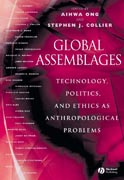
Global assemblages: technology, politics, and ethics as anthropological problems
Ong, Aihwa
Collier, Stephen J.
Provides an exciting approach to some of the most contentious issues in discussions around globalization - bioscientific research, neoliberalism, governance - from the perspective of the "anthropological" problems they pose; in otherwords, in terms of their implications for how individual and collective life is subject to technological, political, and ethical reflection and intervention. Offers a ground-breaking approach to central debates about globalization with chapters written by leading scholars from across the social sciences. Examines a range of phenomena that articulate broad structural transformations: technoscience, circuits of exchange, systems of governance, and regimes of ethicsor values. Investigates these phenomena from the perspective of the “anthropological” problems they pose. Covers a broad range of geographical areas: Africa, the Middle East, East and South Asia, North America, South America, and Europe. Grapples with a number of empirical problems of popular and academic interest - from the organ trade, to accountancy, to pharmaceutical research, to neoliberal reform. Aihwa Ong is Professor of Anthropology and Southeast Asian Studies at the University of California, Berkeley. Stephen J. Collier is a faculty member at the Graduate Program in International Affairs, The New School University. INDICE: Notes on Contributors. Acknowledgments. Part I: Introduction. 1. Global Assemblages, Anthropological Problems. (Stephen J. Collier and Aihwa Ong). 2. On Regimes of Living. (Stephen J. Collier and Andrew Lakoff). 3. Midst Anthropology's Problems. (Paul Rabinow). Part II: Bioscience And Biological Life. Ethics of Technoscientific Objects. 4. Stem Cells R Us: Emergent Life Formsand the Global Biological. (Sarah Franklin). 5. Operability, Bioavailability,and Exception. (Lawrence Cohen). 6. The Iceland Controversy: Reflections on the Transnational Market of Civic Virtue. (Gisli Pálsson and Paul Rabinow). Value and Values. 7. Time, Money, and Biodiversity. (Geoffrey Bowker). 8. Antiretroviral Globalism, Biopolitics, and Therapeutic Citizenship. (Vinh-Kim Nguyen). 9. The Last Commodity: Post-Human Ethics and the Global Traffic in "Fresh" Organs. (Nancy Scheper-Hughes). Part III: Social Technologies And Disciplines. Standards. 10. Standards and Person-Making in East Central Europe. (Elizabeth Dunn). 11. The Private Life of Numbers: Audit Firms and the Government of Expertise in Post-Welfare Argentina. (Andrew Lakoff). 12. Implementing Empirical Knowledge in Anthropology and Islamic Accountancy. (Bill Maurer). Practices of Calculating Selves. 13. Cultures of Expertise and the Management of Globalization. Toward the Re-functioning of Ethnography. (Douglas Holmes and George Marcus). 14. The Discipline of Speculators. (Kate Zaloom). 15. Cultures on the Brink: Re-engineering the Soul of Capitalism - on a Global Scale. (Kris Olds and Nigel Thrift). Managing Uncertainty. 16. Heterarchies of Value: Distributing Intelligence and Organizing Diversity in a New Media Startup. (Monique Girard and David Stark). 17. Failure as an Endpoint. (Hirokazu Miyazaki and Annelise Riles). Part IV: Governmentality And Politics. Governing Populations. 18. Ecologies of Expertise. Asian Governmentality in the Knowledge Society. (Aihwa Ong). 19. Globalization and Population Governance in China. (Susan Greenhalgh). 20. Budgets and Biopolitics. (Stephen J. Collier). Security, Legitimacy, Justice. 21. State and Urban Space in Brazil: From Modernist Planning to Democratic Interventions. (Theresa Caldeira and Jim Holston). 22. The Garrison-Entrepot: AMode of Governing in the Chad Basin. (Janet Roitman). Citizenship and Ethics.23. Biological Citizenship. (Nikolas Rose and Carlos Novas). 24. Robust Knowledge and Fragile Futures. (Marilyn Strathern). Index.
- ISBN: 978-0-631-23175-2
- Editorial: Wiley-Blackwell
- Encuadernacion: Desconocida
- Páginas: 512
- Fecha Publicación: 30/04/2008
- Nº Volúmenes: 1
- Idioma: Inglés
